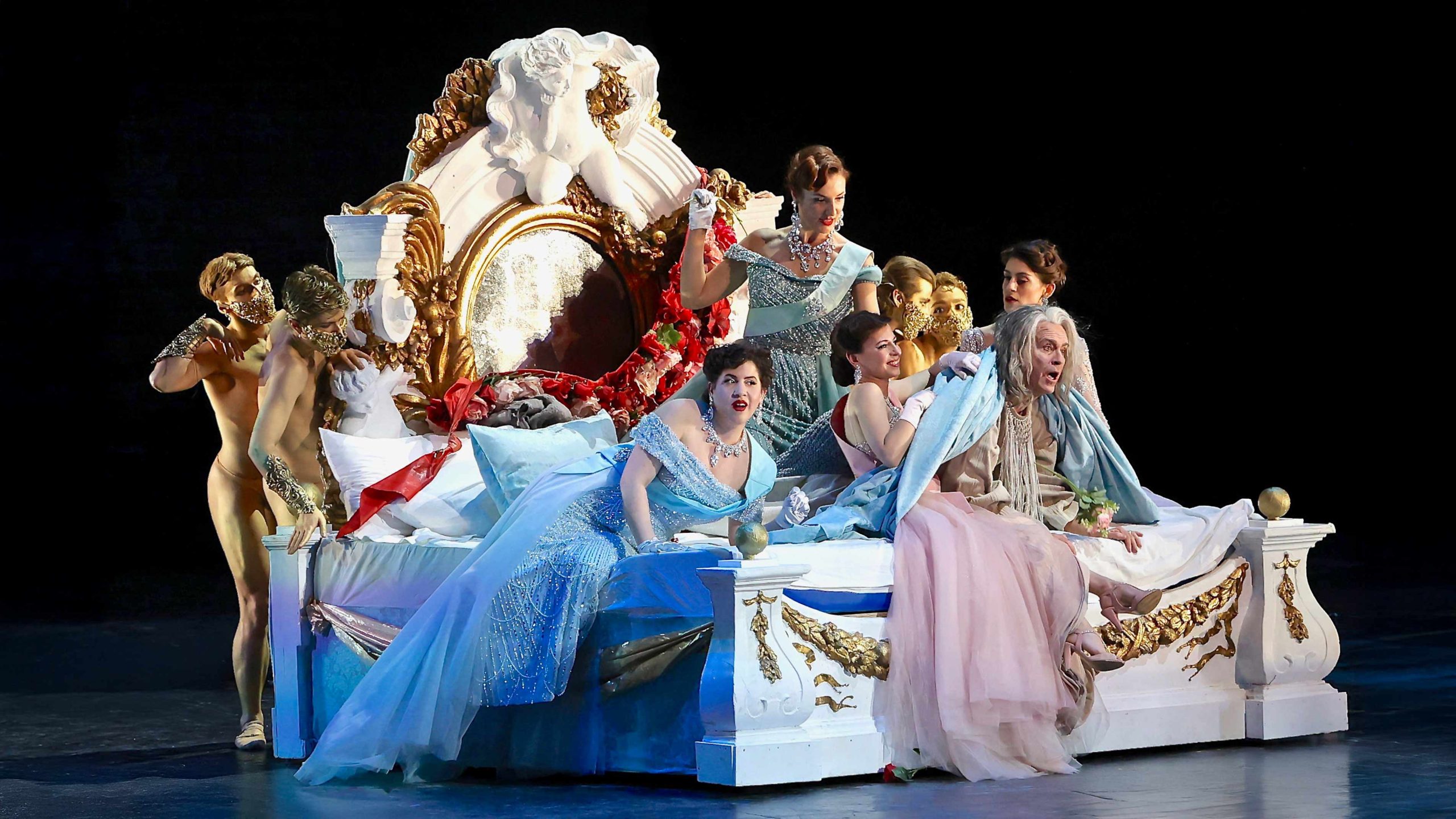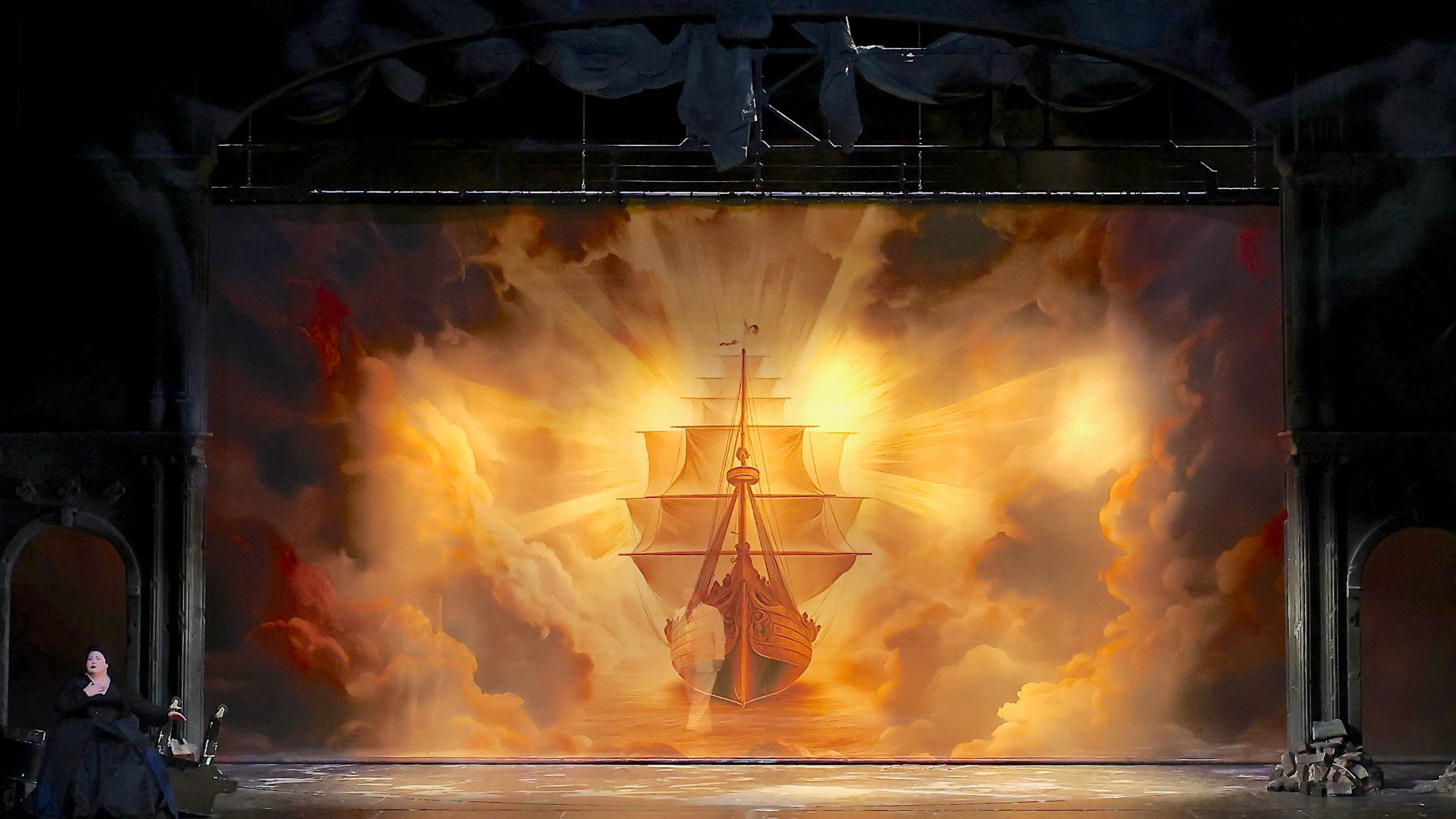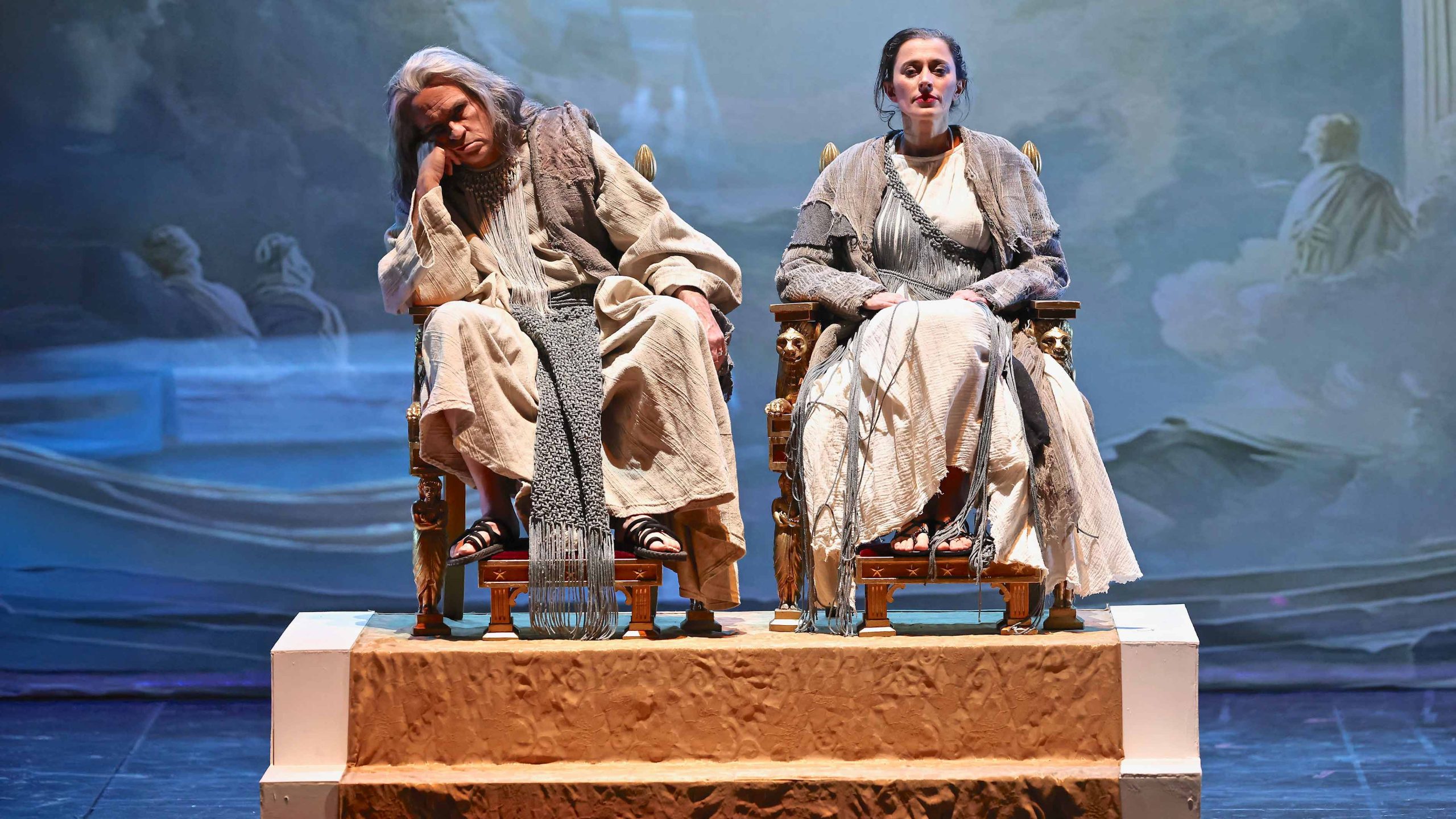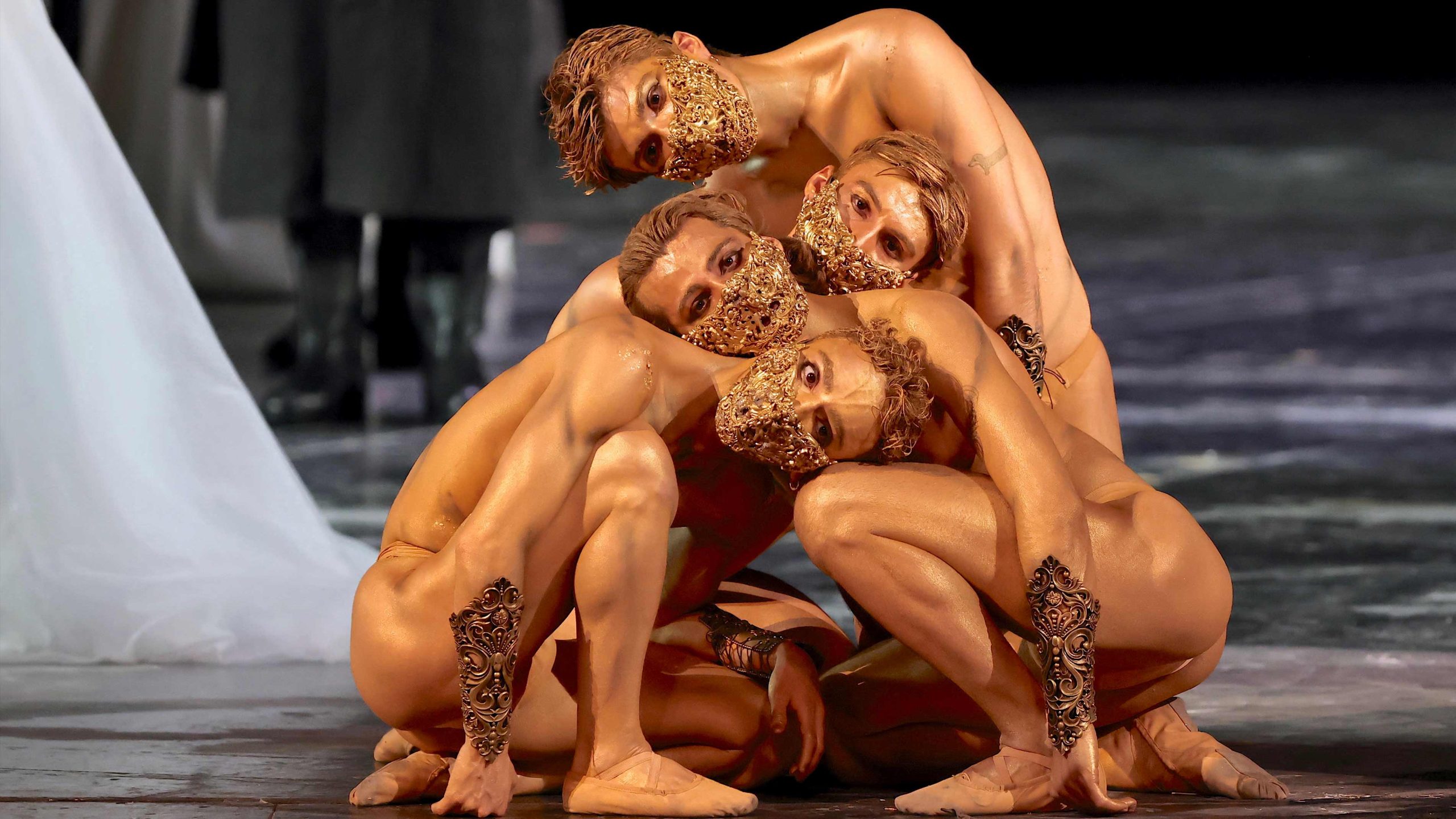Joyous Mythology in three acts by Richard Strauss, libretto by Joseph Gregor
A new production by Fondazione Teatro Carlo Felice di Genova
Italian premiere of the original version
with Italian artistic ensembles
Characters and interpreters:
Jupiter
Scott Hendricks
Merkur
Timothy Oliver
Pollux
Tuomas Katajala
Danae
Angela Meade
Xanthe
Valentina Farcas
Midas
John Matthew Myers
Erste König
Albert Memeti
Zweite König
Eamonn Mulhall
Dritte König
Nicolas Legoux
Vierte König
John Paul Huckle
Semele
Anna Graf
Europa
Agnieszka Adamczak
Alkmene
Hagar Sharvit
Leda
Valentina Stadler
Vier Wächter
Domenico Apollonio
Bernardo Pellegrini/Davide Canepa (13, 16)
Luca Romano
Andrea Scannerini
Eine Stimme
Valeria Saladino
Conductor
Michael Zlabinger
Director
Laurence Dale
Scenes and costumes
Gary McCann
Lighting
John Bishop
Choreographer and assistant director
Carmine De Amicis
Assistant costume designer
Gabriella Ingram
Orchestra, Chorus and Technicians of the Opera Carlo Felice Genova
Choirmaster Claudio Marino Moretti
Ballet Fondazione Formazione Danza e Spettacolo ‘For Dance’ ETS
Dancers
Daniele Bracciale, Luca Cappai
Simone Cristofori, Giuseppe Sanniu
Mimes
Erika Melli, Roberto Pierantoni
Mime acrobat
Davide Riminucci
Stage Director
Luciano Novelli
Stage musical director
Simone Ori
Hall Masters
Sirio Restani, Antonella Poli
Stage Masters
Andrea Gastaldo, Anna Maria Pascarella
other Choir Master
Patrizia Priarone
Lighting Master
Luca Salin
Master of supertitles
Simone Giusto
Music archive manager
Simone Brizio
Stage director
Alessandro Pastorino
Deputy stage manager
Sumireko Inui
Console Handling Manager
Andrea Musenich
Engineer foreman
Gianni Cois
Foreman electricians/lighting booth
Marco Gerli
Tooling foreman
Tiziano Baradel
Head of audio/video department
Walter Ivaldi
Head of tailoring, shoemaking, make-up and wigs
Elena Pirino
Make-up and hair co-ordinator
Raul Ivaldi
Assistant director
Lydia Rotter
Stage Assistant
Gloria Bolchini
Sets, props and costumes
Fondazione Teatro Carlo Felice
Equipment
E. Rancati
Footwear
Epoca
Wigs
Audello Teatro
Supertitles by
Enrica Apparuti
Opera in brief
by Ludovica Gelpi
Die Liebe der Danae (Danae’s Love) is the last great work by Richard Strauss. He began composing it at the end of the 1930s, working together with the librettist Joseph Gregor, who adapted a draft libretto already written for Strauss by Hugo von Hofmannsthal in 1920, entitled Danae, or the Marriage of Convenience. It was a gay mythology in three acts. As is well known, the composer had already been inspired by the world of Ancient Greece in the past, just think of the well-known examples of titles such as Elektra and Die ägyptische Helena, given the historical contingencies, the choice of comic genre is surprising. During that period the rise of Nazism had profoundly shocked Strauss, who witnessed the profound socio-political and cultural upheavals of his beloved Germany, which was now unrecognisable to him. Die Liebe der Danae was completed in June 1940. The first performance should have been held at the Salzburg Festival in August 1944, but only a few weeks before, due to the assassination attempt on Hitler, Goebbels closed all the theatres. Exceptionally, a closed-door dress rehearsal was allowed, in the presence of a small number of guests including the composer, and conducted by Clemens Krauss. Strauss hoped that he, the musicians and the performers would be able to stage Danae again in better times, but unfortunately this hope was not fulfilled, as the composer died in 1949. Danae would finally be presented to the general public only three years later, again at the Salzburg Festival and conducted by Krauss, on 14th August 1952.
The story mainly revolves around three protagonists: Danae, daughter of the indebted King Pollux, is mysteriously fascinated by the dream of a golden rain that covers her and fills her with joy. Jupiter is obsessed with the idea of winning her over, and Midas, in the past a modest donkey herder, is now transported to a world of shining palaces and supernatural powers according to Jupiter’s plans. None of the three have a comic connotation, it is mainly Pollux, the four kings and the four queens that create a comic framework. The character of Danae, deeply lyrical, is characterised by the enigma that her feelings represent (In the depths of the soul, / inaccessible, / enigma for the god, / enigma for man / lies the love of Danae). Jupiter is unusually multi-faceted on a psychological level, domineering and quick-tempered, eager to conquer Danae, but also sincerely in love and, particularly in the third act, vulnerable. Midas is the most ‘classic’ of operatic characters, the tenor in love, at first at the mercy of Jupiter’s will and then ready to challenge the god and lose his power to remain with his beloved Danae. The dramatic development is unusual in that the opera was initially supposed to end with the first two acts. Towards the end of the second act, Danae has to choose between the sincere love of Midas and the promises of wealth made to him by Jupiter. The climax of tension is resolved when she utters Midas’s name, and the plot is resolved in itself. The third act is an unexpected dramatic and musical space, yet a place of fundamental reflection in the economy of the whole. Jupiter seeks one last contact with Danae, assumes the guise of a traveller and visits her in the hut where she and Midas live in poverty. When Danae, despite everything, declares that she is still in love with Midas, Jupiter renounces her forever and blesses her. This ending has a significant impact both for the characterisation of Jupiter and for the way in which the themes of love and poverty are treated, themes that are not typical of a mythological tale but rather of a parable of Christian inspiration.
Strauss’ writing very effectively encapsulates the expression of his own artistic journey and therefore the aesthetics of that German culture that seemed to have been lost by then. There is no reference to the twentieth-century avant-garde that had already developed extensively in Europe in the 1920s and 1930s. Rich sound combinations, articulated lines and textures, shining and golden like the rain that Danae sees falling on her in her dream, combine in the evocative scope typical of Strauss’s music, the ‘sensual materiality’ that distinguishes it. The composer’s bond with that exquisitely German and late 19th-century cultural climate is indissoluble, and here he seems to bid farewell to it, at the end of his time, with an outburst of intense vitality. A luminous celebration of the sense of the end.



